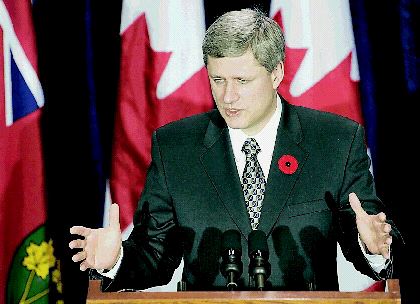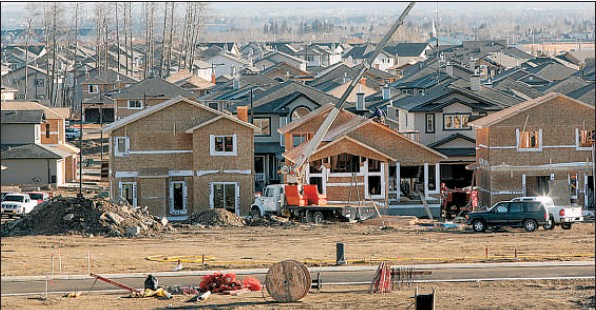Speculative activity also declining, but other market factors holding up despite economic uncertainty
Brian Morton
Sun

Housing starts and new home prices in Metro Vancouver are beginning to head south at a time when speculative activity in the market is declining significantly, according to a local housing analyst and two surveys released Monday.
Preliminary figures from Canada Mortgage and Housing Corporation, Canada’s national housing agency, indicate that housing starts in Metro Vancouver stood at 1,846 homes in October, a slight decline compared to September.
However, year-to-date housing starts are about four per cent above 2007 figures.
As well, a Statistics Canada new housing price index indicated that Vancouver dropped 0.1 per cent in September compared to August, and rose just 1.4 per cent from September 2007 to September 2008 — below the national average of 2.1 per cent over the same period.
CMHC market analyst Richard Sam said in an interview Monday the numbers indicate Metro Vancouver is not doing too badly, considering the climate of economic uncertainty.
He said that despite a softening resale market, developers are still going ahead with projects that have been in the pre-construction stage.
“Right now, I think it’s been okay in terms of jobs created and personal income growth,” said Sam. “In terms of October, we see the actual numbers as a solid figure. Any time you reach over 1,200 units for the month is a good sign.”
Sam said a lot of projects won’t be completed until late 2009 or 2010, when CMHC expects the market to pick up again. “And the number of construction jobs have actually been pretty solid.”
The CMHC report also indicated that housing starts in the Abbotsford area for the month declined by nearly two-thirds from the number started in October 2007 (71 in 2007 compared to 29 in 2008). However, for the whole year, starts in the Abbotsford area are up 26.5 per cent, from 976 to 1,235.
A housing analyst also said in an interview Monday that speculation is dropping off in Metro Vancouver.
“We’ve seen a decline in the number of concrete condominium sales in this quarter compared to 2007,” said Jennifer Podmore, managing partner of Vancouver-based MPC Intelligence, a research group that tracks and analyses the new residential development market.
“That tells us that speculative activity has declined significantly in the last year. But that’s also quite good. It means homes now being bought are for people who intend to live in them. They’re real homes for real people.”
Podmore said the lower speculative activity is one reason for the levelling off in housing starts, “which we see as a good thing because it’s keeping the equilibrium of supply and demand in check.
“We haven’t seen any dramatic declines in value,” added Podmore. “Those who have to sell immediately are selling for a discount. That’s where prices are coming off. But most people are adopting a wait-and-see [attitude] and they’re getting their price.
“We’re seeing a market that’s not a buyer’s or a seller’s market.”
Podmore said the number of sales are down from 2007, but there are some bright spots, or potential bright spots, in the coming months.
She said the market is relatively strong in the Fraser Valley and “we’re also seeing the number of townhouse sales this quarter compared to last year holding steady.”
Podmore said there’s not much product available in Squamish now and that sales activity should increase there next year.
“They’re about to get a brand- new highway and they’re centre ice in terms of the exposure they’re about to get [with the 2010 Olympics].
“[The highway upgrade] brings Squamish a lot closer and makes it just as viable a commute as Langley or Surrey.”
Peter Simpson, chief executive officer of the Greater Vancouver Home Builders’ Association, also said in an interview that the CMHC’s year-to-date statistics bode well for the industry.
“There were 17,510 housing starts [in Metro Vancouver], which are up four per cent over last year. They’ve generated a tad over 49,000 full-time jobs for the year.”
Simpson said that if the pace continues, Vancouver will achieve its highest number of starts since 1993.
“That’s the silver lining in all this negative news. A lot of projects are going forward.”
Simpson said starts are expected to drop to about 16,500 in 2009.
“We’ll slide somewhat next year, but the numbers are still healthy in a historical context.”
Meanwhile, StatsCan reported Friday that a decline in construction and manufacturing jobs pushed B.C.’s unemployment rate up half a percentage point in October.
B.C.’s jobless rate now stands at 5.1 per cent, the highest since December 2006, and represents 8,200 fewer full-time jobs than were available in September.
The construction sector took the biggest hit with 6,200 fewer jobs than a month earlier — a 2.8-per-cent decline.
Across B.C., there were still 16.1 per cent more construction jobs compared to October 2007. In the Lower Mainland, 17.8 per cent more people were working in construction compared to October 2007.






